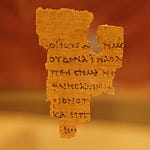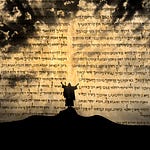On this episode, Shane continues weaving together various interviews he’s recorded on topics related to the reasons Christians can have confidence in the portrait of Jesus presented in the New Testament Gospels. During this podcast, you’ll hear from Peter J. Williams, Richard Bauckham, John Dickson, D.A. Carson, Craig Blomberg, Lydia McGrew, and Daniel Wallace. Click here to begin with Part 1
SHOW NOTES
Related Books
Can We Trust The Gospels?, Peter J. Williams
Jesus & The Eyewitnesses, Richard Bauckham
Jesus: A Very Short Introduction, Richard Bauckham
Testimony of The Beloved Disciple, Richard Bauckham
Is Jesus History?, John Dickson
A Doubter’s Guide To Jesus, John Dickson
The Gospel According to John, D.A. Carson
Introduction to the New Testament, D.A. Carson
Can We Still Believe The Bible?, Craig Blomberg
The Historical Reliability of the Gospels, Craig Blomberg
Revisiting the Corruption of the New Testament, Daniel Wallace
Testimonies to the Truth, Lydia McGrew
Related Articles
The Gospels as Authentic Testimony, Richard Bauckham
You Can Trust the Four Gospels, Craig Blomberg
Authenticating The Fourth Gospel, Shane Rosenthal
Why Should We Believe The Bible?, Shane Rosenthal
What is Faith?, Shane Rosenthal
How to Detect Deception, Shane Rosenthal
On Faith & History, Shane Rosenthal
Jesus & The Eyewitnesses: A Review, Shane Rosenthal
Undesigned Coincidences, Lydia McGrew & Shane Rosenthal
Other Related Resources
New Evidence for the Gospels, Peter J. Williams (video)
Evidence for the Resurrection, Peter J. Williams (video)
Are the Gospels Reliable?, Peter J. Williams & Bart Ehrman (video)
Authenticating The Book of Acts, Lydia McGrew (podcast)
Richard Bauckham on the Reliability of John, (podcast)
An Interview with D.A. Carson, Shane Rosenthal (podcast)
The Historical Reliability of John’s Gospel, Craig Blomberg (podcast)
For more information about Daniel Wallace’s view of an early date for John’s Gospel, see: “John 5:2 & The Date of The Fourth Gospel”, “John 5:2 (Part 2)”, “John 5:2 (Part 3),” as well as, “The Gospel of John: An Introduction.” In a recently discovered commentary on John’s Gospel, nineteen-century Cambridge scholar J.B. Lightfoot wrote: “This is the narrative of a person who was an eyewitness of the events he relates, and who writes not half a century later, but within a very few years of the occurrence,” (p. 197). John A.T. Robinson famously argued for a pre-70 date for the Fourth Gospel in Redating the New Testament, and The Priority of John, and Leon Morris, in the 1995 revised edition of his NICNT commentary on the Gospel of John, he sides with scholars who suggest that John may have been written as early as the late 50s to early 60s. In his 2015 CPH commentary, Lutheran theologian William Weinrich lists several compelling reasons for dating John well before the Jewish War, and Cambridge NT scholar Peter J. Williams, in Can We Trust The Gospels? (2018), argues that all four NT Gospels “are so influenced by Judaism in their outlook, subject matter, and detail that it would be reasonable to date them considerably before the Jewish War” (p. 81). Even more recently, Jonathan Bernier, author of Rethinking the Dates of the New Testament (2022), observes that, “Whereas most scholars favor a date for John’s Gospel at or around 90, this study concludes that [it] was most likely written sometime between 60 and 70 (p. 87).
We Need Your Help!
Consider supporting The Humble Skeptic podcast by making a one-time gift or by upgrading to a paid subscription via Substack ($5.95 per month, $59 per year). Use the button below for more information about giving options.
















Faith Founded on Facts (Part 2)